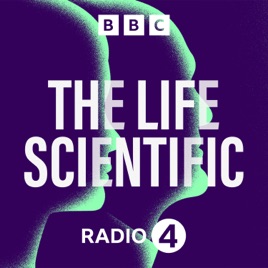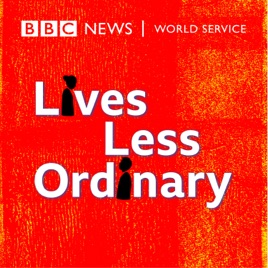
Advertise on podcast: The Life Scientific
Rating
4.6 from
Country
This podcast has
300 episodes
Language
Publisher
Explicit
No
Date created
2011/10/04
Average duration
30 min.
Release period
11 days
Description
Professor Jim Al-Khalili talks to leading scientists about their life and work, finding out what inspires and motivates them and asking what their discoveries might do for us in the future
Podcast episodes
Check latest episodes from The Life Scientific podcast
Michael Wooldridge on AI and sentient robots
2023/12/19
Humans have a long-held fascination with the idea of Artificial Intelligence (AI) as a dystopian threat: from Mary Shelley's Frankenstein, through to the Terminator movies.
But somehow, we still often think of this technology as 'futuristic': whereas in fact, it's already woven into the fabric of our daily lives, from facial recognition software to translator apps. And if we get too caught up in the entertaining sci-fi narrative around AI and the potential threat from machines, there's a more pressing danger that we overlook real and present concerns - from deep fakes to electoral disinformation.
That's why Michael Wooldridge is determined to demystify AI and explain how it can improve our lives, in a whole host of different ways. A Professor of Computer Science at the University of Oxford, and the Director of Foundational AI Research at the Alan Turing Institute, Mike believes the most common fears around this technology are "misplaced".
In a special 300th edition of The Life Scientific, recorded in front of an audience at London's Royal Institution (RI), Mike tells Jim Al-Khalili how he will use this year's prestigious RI Christmas Lectures to lift the lid on modern AI technology and discuss how far it could go in future.
Mike also reminiscences about the days when sending an email was a thrilling novelty, discusses why people love talking to him about the Terminator at parties, and is even challenged to think up a novel future use of AI by ChatGPT...
Produced by Lucy Taylor.
more
Mercedes Maroto-Valer on making carbon dioxide useful
2023/12/12
How do you solve a problem like CO2?
As the curtain closes on the world’s most important climate summit, we talk to a scientist who was at COP 28 and is working to solve our carbon dioxide problem.
Professor Mercedes Maroto-Valer thinks saving the planet is still Mission Possible - but key to success is turning the climate-busting gas, CO2, into something useful. And as Director of the Research Centre for Carbon Solutions at Heriot-Watt University and the UK’s Decarbonisation Champion, she has lots of innovative ideas on how to do this.
She also has a great climate-themed suggestion for what you should say when someone asks your age…
Produced by Gerry Holt
more
Sir Harry Bhadeshia on the choreography of metals
2023/12/05
The Life Scientific zooms in to explore the intricate atomic make-up of metal alloys, with complex crystalline arrangements that can literally make or break structures integral to our everyday lives.
Professor Sir Harry Bhadeshia is Professor of Metallurgy at Queen Mary University of London and Emeritus Tata Steel Professor of Metallurgy at the University of Cambridge. He’s been described as a ‘steel innovator’ – developing multiple new alloys with a host of real-world applications, from rail tracks to military armour.
Harry’s prolific work in the field has earned him widespread recognition and a Knighthood; but it's not always been an easy ride...
From his childhood in Kenya and an enforced move to the UK as a teenager, to the years standing up to those seeking to discredit the new path he was forging in steel research - Jim Al-Khalili discovers that Harry's achievements have required significant determination, as well as hard work.
Produced by Lucy Taylor.
more
Cathie Sudlow on data in healthcare
2023/11/28
“Big data” and “data science” are terms we hear more and more these days. The idea that we can use these vast amounts of information to understand and analyse phenomena, and find solutions to problems, is gaining prominence, both in business and academia.
Cathie Sudlow, Professor of Neurology and Clinical Epidemiology at the University of Edinburgh, has been at the forefront of enabling health-related research using ever-increasing datasets. She tells presenter Jim Al-Khalili why this type of research matters, how the COVID-19 pandemic changed attitudes towards data in healthcare, and why the NHS gives the UK a big advantage when it comes to population-wide studies.
Over the course of her career, Cathie has held a variety of roles at different organisations, and she is currently Chief Scientist and Deputy Director at Health Data Research UK. She believes that there is no room for prima donnas in science, and wants her field to be open and collaborative, to have the most impact on patients’ lives.
Produced by Florian Bohr.
more
Sir Michael Berry on phenomena in physics' borderlands
2023/11/21
Professor Jim Al-Khalili meets one of Britain's greatest physicists, Sir Michael Berry. His work uncovers 'the arcane in the mundane', revealing the science that underpins phenomena in the world around us such as rainbows, and through his popular science lectures he joyfully explains the role of quantum mechanics in phones, computers and the technology that shapes the modern world. He is famed for the 'Berry phase' which is a key concept in quantum mechanics and one Sir Michael likes to explain through an analogy of holding a cat upside and dropping it, or parallel parking a car.
Presenter: Jim Al-Khalili
Studio Producer: Tom Bonnett
Audio Editor: Gerry Holt
more
Professor Sarah Harper on how population change is remodelling societies.
2023/11/14
People around the world are living longer and, on the whole, having fewer children. What does this mean for future populations? Sarah Harper CBE, Professor in Gerontology at the University of Oxford, tells presenter Jim Al-Khalili how it could affect pensions, why it might mean we work for longer, and discusses the ways modern life is changing global attitudes to when we have children, and whether we have them at all. Fertility and ageing have been Sarah's life's work and she tells her story of giving up a career in the media to carry out in-depth research, and going on to study population change in the UK and China, setting up the Oxford Institute of Population Ageing and later becoming a Scientific Advisor to UK Government.
Presenter: Jim Al-Khalili
Producer: Tom Bonnett
more
Sarah Blaffer Hrdy on human evolution and parenthood
2023/11/07
Our primate cousins fascinate us, with their uncanny similarities to us. And studying other apes and monkeys also helps us figure out the evolutionary puzzle of what makes us uniquely human. Sarah Blaffer Hrdy’s work brings a female perspective to this puzzle, correcting sexist stereotypes like the aggressive, philandering male and the coy, passive female.
Sarah is Professor Emerita of Anthropology at the University of California, Davis, and studies female primate behaviour to create a richer picture of our evolutionary history, as well as what it means to be a woman or a parent today.
Her overarching aim is to understand the human condition, a goal she initially planned to pursue by writing novels. Instead, she found her way into science: her groundbreaking study of infanticide among langur monkeys in northern India overturned assumptions about these monkeys’ murderous motivations.
Later in her career, she looked into reproductive and parenting strategies across species. We humans are primed by evolution, she believes, to need a lot of support raising our children. And that’s a concern she found reflected in her own life, juggling family commitments with her career ambitions as a field researcher, teacher, and science writer.
Produced by Cathy Edwards.
more
Edward Witten on 'the theory of everything'
2023/10/31
The Life Scientific returns with a special episode from the USA; Princeton, New Jersey, to be precise.
Here, the Institute for Advanced Study has hosted some of the greatest scientific minds of our time - Einstein was one of its first Professors, J. Robert Oppenheimer its longest-serving director - and today's guest counts among them.
Edward Witten is Professor Emeritus at the Institute and the physicist behind M-Theory, a leading contender for what is commonly referred to as ‘the theory of everything’, uniting quantum mechanics and Einstein’s theory of gravity.
He talks to Jim Al-Khalili about a career that’s spanned some of the most exciting periods in modern theoretical physics - and about one particular problem that's both obsessed and eluded him since his days as a student…
Produced by Lucy Taylor.
more
Alex Antonelli on learning from nature's biodiversity to adapt to climate change
2023/09/19
With the world's biodiversity being lost at an alarming rate, Alexandre Antonelli, Director of Science at the Royal Botanic Gardens, Kew, has made it his life's mission to protect it. He is a bio-geographer revealing how changes to the Earth's landscape, such as the formation of mountain ranges and rainforests, leads to the evolution of new species and causes plants, fungi and animals to move around the world.
His work is a masterclass in joined-up thinking, bringing together different fields of research by starting conversations between scientists who would rarely talk to one another. Together, they paint a more holistic picture of how our planet's biodiversity has developed in the hope of informing how we can protect it in the future.
Alex tells presenter Jim Al-Khalili about a life spent in the wild, beginning with his earliest memories of growing up in Brazil cataloguing life in the Atlantic Rainforest. That passion is still with him today. We've only scratched the surface of understanding what lives here on Earth, he says, more than 4,000 new species are found every year. Alex is passionate that we need to speed up the rate at which we document the richness of life, arguing if we don't identify what there is we can't protect it.
Presented by Jim Al-Khalili
Produced by Tom Bonnett
more
Paul Murdin on the first ever identification of a black hole
2023/09/12
Astronomer Paul Murdin believes a good imagination is vital for scientists, since they're so often dealing with subjects outside the visible realm.
Indeed, over a long and successful career his imagination has taken him on a journey through space, discovering various new and unusual celestial occurrences - notably the first successful identification of a black hole, Cygnus X-1.
Paul tells Jim Al-Khalili how he spent much of his career at the Royal Greenwich Observatory, working with astronomers around the world on some of the most advanced telescopes ever built. He headed up the Astronomy section of the UK’s Particle Physics and Astronomy Research Council, was Director of Science for the British National Space Centre and even has an asteroid named after him.
This list of achievements is testament to the fact that Paul has never let his disability hold him back; a leg brace and walking sticks have been part of his life since contracting polio in childhood. But he maintains that as long as you have curiosity and a vibrant imagination, nothing should stand in your way.
Produced by Lucy Taylor.
more
Bahija Jallal on the biotech revolution in cancer therapies
2023/09/05
Some of the most complex medicines available today are made from living cells or organisms - these treatments are called biopharmaceuticals and in this episode of The Life Scientific Dr Bahija Jallal, CEO of Immunocore, shares her story of leaving her home in Casablanca, Morocco to become a world leader in developing biopharmaceutical cancer treatments.
She tells Professor Jim Al-Khalili that she has always found herself ahead of the curve. When she began in oncology, the study of cancer, the common treatment was chemotherapy which attacked all the cells in an affected area. Her first studies into cancer treatments were looking at how certain therapies could focus in on the cancerous cells and move away from what she describes as the 'sledgehammer' of traditional chemotherapy.
It was an early step in what became known as targeted cancer therapies, and it set Bahjia on course for a career dedicated to developing innovative drugs to improve cancer patients' lives. Through a deep understanding of the science and a resolute commitment to putting treatments in the hands of people who need them, she has produced astonishing results. Bahija has brought drugs to market faster than many believed was possible, and she has managed it by being an inspirational leader and encouraging her teams to think differently. How has she done it? Part of the secret, she says, is diversity of thought.
Presented by Professor Jim Al-Khalili
Produced by Tom Bonnett
more
Sir Colin Humphreys on electron microscopes, and the thinnest material in the world
2023/08/29
How much more of our world could we understand, if we could take stock of it, one atom at a time? If we could see the structure of individual molecules, understand the complex ways they interact with one another, and witness first-hand how they move?
These are questions for electron microscopy, and more broadly, for Materials Science.
Materials scientists peer into the atomic structure of the stuff that makes up our world, to figure out the relationships between the structure of a material, and its resulting properties. They study how to change materials at the molecular level, to improve the way they function in the real world. It’s an interdisciplinary field that spans the physics and chemistry of matter, engineering, and industrial manufacturing. It’s led to an enormous number of advances, from nanotechnology to aerospace engineering, pioneering medical innovations to quantum computing.
And SOME of these advances are thanks to the work of Professor Colin Humphreys.
As Professor of Materials Science at Queen Mary University of London, and Distinguished Research Fellow at the Department of Materials Science at the University of Cambridge, Colin works on materials with fascinating properties that would be hard to understand without delving into their atomic structure: semiconductors, superconductors, nanoparticles, and ultra-high temperature aerospace materials.
He’s also a committed student of Christianity and applies his scientific mind to questions of biblical scholarship: calculating the exact date of the crucifixion for example, or naturalistic explanations for miracles.
Produced by Emily Knight
more
Podcast reviews
Read The Life Scientific podcast reviews
Tim_MN
2023/09/21
Great guests and excellent topics.
I really enjoy this podcast. The biographies are interesting to hear, and I learn a lot of fascinating science.
Anon32589
2021/03/05
Learn about Science and the People Behind the Science
Highly recommend for those interested in learning about science and scientists! The host, Professor Jim Al-Khalili, draws out from his guests--who are...
more
llamaneck
2020/02/23
Keeps Interest if you love learning WHY...
Gonna keep Listening!
Brit by the Bay
2020/07/07
Insights and ideas
Beautifully done. Jim the physicist does an amazing job of making a wide range of science areas seem totally accessible, understandable and within rea...
more
Lundgrenn
2019/02/05
Helped me carry on
This podcast, specifically the interview with Dr. Andrea Sella, helped keep me motivated to finish graduate school. Thank you.
Mixbehaving
2020/02/19
Great Content potentially the worst mixing of all time.
Why would one want to listen to something mixed like this? I’m listening in headphones and it sounds like people are talking behind me and in one ear ...
more
solong4now
2018/08/20
Candid conversations with scientists
This is kind of a "What makes them tick" kind of conversational podcast. I think more people need to be more aware of the scientist who inform us in ...
more
Dennis_Home_Again
2017/10/22
All the interesting people are here.
I’m so happy I have access into the minds of people who I admire.
budsalinger
2017/04/29
I like it
I used to eat very little sodium. The past year ive been eating a ketogenic diet and also fasting. My keto podcasts that i listen to i think all sugge...
more
Apple1234Pie
2017/04/23
Needs More Depth
Not enough detail, but better than some other BBC Radio 4 shows.
Podcast sponsorship advertising
Start advertising on The Life Scientific & sponsor relevant audience podcasts
You may also like these personal journals Podcasts

4.7
420
213
Just Glow With It
Jasmine Shah

4.9
1153
51
The Sister Circle Podcast
Chrystal Evans Hurst

4.9
1378
248
hey, girl.
Alex Elle

4.1
574
32
NATAL
You Had Me at Black, The Woodshaw

4.9
454
456
Cereal Killers
Cereal Killers

4.7
387
102
Lives Less Ordinary
BBC World Service

4.8
5151
327
The Next Right Thing
with Emily P. Freeman

4.5
82
392
Read It On Reddit
Read It Podcasts

4.8
53
86
The Funky Farm Girl
Jenny Veleke

4.9
1346
112
Stories with Sapphire
Sapphire Sandalo



